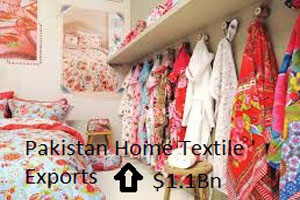
Pakistan sees growth in home textile exports
YarnsandFibers News Bureau 2014-12-22 10:00:00 – IslamabadPakistan home textiles exports has grew to $1.1 billion from January to September – higher by $235.8 million or 27.7% over the comparative period. While, garments exports increased to $1.9 billion, showing net addition of $399 million on back of 27.1% growth due the European duty-free access scheme.
Pakistan has so far earned $910 million extra by availing the scheme, which is almost equal to the money that the country raised this month from international markets by paying almost 7% interest.
From January to September this year, the proceeds from exports to the European Union (EU) amounted to $5.7 billion – higher by $909.1 million or almost one-fifth over the comparative period – announced the Federal Minister for Commerce, Khurram Dastgir, on Thursday.
The encouraging trend was reported at a time when the country’s overall exports have significantly plunged in the current fiscal year due to increasing cost of doing business. The figures are compiled by EuroStat, the EU’s data collection agency.
The government had estimated additional $1 billion impact in first year of implementation and it was already nearing the goal within nine months, said the minister.
In order to monitor progress on implementation of 27 conventions of the United Nations a treaty monitoring cell is also working. The EU has linked the continuation of the concessionary regime with Pakistan’s ability to ensure implementation of these conventions that deal in human right, labour, gender and minorities rights.
However, the persistent energy crisis has been hampering overall exports but hoping that the import of Liquefied Natural Gas by early next year would significantly lessen the woes of the consumers.
The government’s decision to increase minimum wages to Rs12,000 per month, increase in electricity prices and appreciation of rupee against the US dollar also affected the competitiveness of Pakistan’s exports.
The declining trend in overall exports in the current fiscal year has necessitated thorough review of the country’s trade regime. The government is also working to bring changes through Strategic Trade Policy Framework, as it plans to introduce new framework for next three years by early next year.
The federal commerce minister said that the strategic trade policy should not be seen a subsidy package for exporters. In fact, the government would give preference to lower taxes instead of giving subsidies and abuse of import licences will be stopped.
Taxation, tariff structure, increase in cost of doing business, non-tariff barriers like opening sealed containers and appreciation of rupee are the main issues affecting the country’s exports.
The Ministry of Commerce is going to recommend the government to either declare the textile sector exports as zero-rated or clear its outstanding refunds.
Market Intelligence
Ask for free sample Report

experience
Customer Base
dedicated team
Countries Served Worldwide









